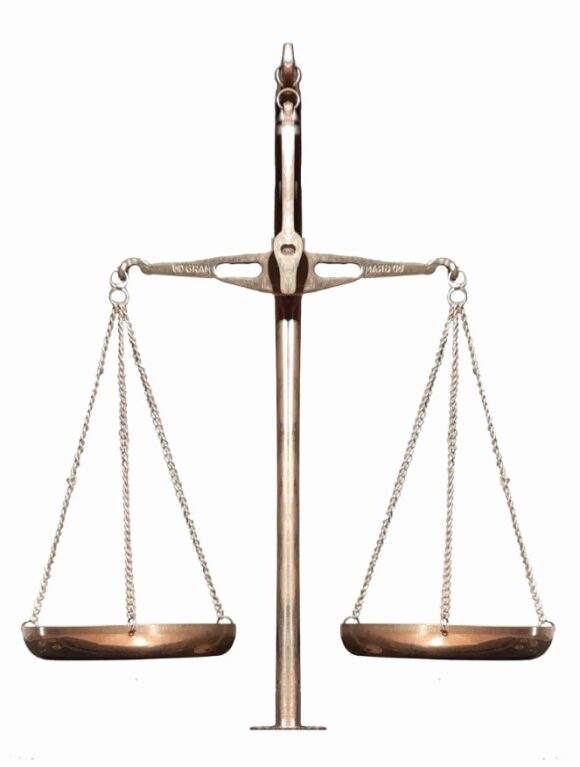LET US BEGIN by thinking about the meaning of the word ‘justice’. The dictionary says that justice is ‘uprightness, honesty; fairness in dealing with others; the awarding of what is due’.
The meaning of the word in the mind of the general public will of course vary between different ages and different cultures. Some things which seemed years ago to be just, are seen as an outrage today. We no longer send little boys up chimneys to sweep them, and light fires under their feet to encourage them to be quick.
Then we come to the meaning of justice in the Bible. Almost always when the word is used in the Bible it means the adjustment of that which is wrong, and the establishment of that which is right. It means the process by which wrong is corrected and right is upheld. Of course the conception of what is right and wrong is not left to the caprice of human judgement. In the Bible, the measurement of right and wrong is the law of God. People are considered just when they do as God commands, and they are unjust when they disobey.
It seems to me that the justice of God operates on three levels:
- In God’s righteousness—the relationship between God and people
- In civic justice—the judicial gov- ernment of a nation (in the Bible case, the nation of Israel)
- In personal justice—the relationship between people.
It must be recognised that the fundamental and foremost idea in the word ‘justice’ when it is used about God is of rightness. This is not easy for everybody to accept. For example there are those who say that God was unjust when He punished Adam and Eve for just one slip in the Garden of Eden (Genesis 3); when He destroyed the cities of Sodom and Gomorrah for their wickedness (Genesis 19); when He struck a man dead for touching the Ark of the Covenant (2 Samuel 6:7), and a man and his wife for telling a lie about their money (Acts 5:1–11).
1. God’s Righteousness
As far as I am concerned, I would never say that God is wrong. I may say that in this case or that case I do not understand His justice, but nevertheless I believe that He is right and it is due to my human frailty that I cannot understand it. Come back to the Garden of Eden. Adam and Eve were clearly taught what they could do and what they could not do. They were free to exercise their will without any bias. They were told what the consequences would be if they disobeyed. But they were tempted, they disobeyed and the consequences about which their Creator had warned them came upon them.
What they had done was a sin against God. ‘Sin came into the world through one man, and death through sin’ (Romans 5:12). Of course in the narrative the awful tragedy is described in a few words—but its seriousness and its sadness we discover in the unfolding story of the human race.
Think of it. Two people endowed with wonderful faculties of the kind that made them the very summit of God’s creation. They were placed under a law that was good and holy, just and spiritual, simple and easy to grasp. And they lived in the paradise of Eden, in friendship with God. They ought never to have disobeyed. Their sin was done against the light and the love that had been bestowed on them, in flagrant opposition to their Creator. The enormity of their sin is apparent when we ponder it carefully.
It is not easy for sinners to realise just what sin means to God. God cannot sin. He cannot tolerate sin. It affronts His holiness. Holiness might be defined as ‘perfect, right, set apart from anything that is not right’. For God, to accept sin and to say “Well never mind, perhaps it will be better next week” would be to devalue and diminish His holiness.
It is sometimes said that love is God’s most important attribute, but I believe that is mistaken. It is indeed a glorious fact that God is love (1 John 4:8), but it is a more glorious fact that God is holy (Leviticus 19:2). We can be sure that God cannot act unjustly or with partiality. Love can be selfish, so it must have standards to determine its quality. Holiness is the measure of God’s love. His righteousness is the standard to determine the quality of His love. God’s love is a holy love. So if we are open to the truth we ought to see that God’s holiness is first—above all things. His righteousness is crucial if we are to trust Him. His justice is paramount.
The trend today in liberal teaching emphasizes God’s love but downplays His holiness. Too often this results in a denial of personal guilt for sin.
2. Civic Justice
We see God’s justice in public administration in relation to the nation of Israel. In the Law of Moses there is a well known phrase: ‘Eye for eye, tooth for tooth, hand for hand, foot for foot’ (Exodus 21:24). Obviously the idea is that the punishment for the wrongdoer shall be equal to his wrongdoing. There are those who say that this was not punishment, it was vengeance. But let us keep to the facts—it was first of all the imposition of justice. There is about this principle something fundamentally right. If a man is carrying a bomb with the intention to maim and kill innocent people, and it explodes and kills him instead, there is a sense that he received his just reward. This is the principle of exact retribution that is seen in the Law of Moses.
The Law did provide for extenuating circumstances. If there was a factor that made the culprit less culpable, this was reflected in the punishment. For example the penalty for murder was death, but if it was a case of accidental manslaughter the culprit could flee to a safe place (Exodus 21:12–14).
So you see that in the administration of public justice under the Law of Moses there was this convicting sense of rightness. An equality of sentence that was right and seen to be right, taking into account any ameliorating circumstances and ensuring that all parties were satisfied if they were true to God’s principles.
Capital punishment was part of God’s justice and, if it was properly administered, no innocent person would have been convicted. I must stress that God’s civic justice is only seen in the divine administration of His own people, Israel, in the time of the Old Testament.
3. Personal Justice
We come now to the justice of God as it is expressed in the personal relationship between people. Consider the response of the Lord Jesus when he was asked whether we should pay taxes: ‘Render to Caesar the things that are Caesar’s, and to God the things that are God’s’ (Matthew 22:21). And later: ‘You shall love your neighbour as yourself’ (v. 39). This embodies the prime idea in God’s justice—that of doing what is right to the exclusion of what is wrong.
The Apostle Paul reveals that love is an obligation of righteousness: ‘Owe no one anything, except to love each other, for the one who loves another has fulfilled the law’ (Romans 13:8). To be unloving, unkind, mean and spiteful is an act of injustice.
The Apostle Peter says ‘Honour everyone’ (1 Peter 2:17). That is an act of justice. As is courtesy: ‘Have unity of mind, sympathy, brotherly love, a tender heart, and a humble mind’ (3:8).
You may say to yourself, what has this to do with the justice of God? Remember the definition with which we began: ‘the adjustment of that which is wrong and the establishment of that which is right’. When people need and deserve kindness, courtesy and pity and instead they get neglect and rudeness, that is unjust. It violates the justice of God.
God’s Judgements
Let us turn at last to God’s final judgements that are to come on the earth. I mean for example:
When the Lord Jesus is revealed from heaven with his mighty angels in flaming fire, inflicting vengeance on those who do not know God and on those who do not obey the gospel of our Lord Jesus (2 Thessalonians 1:7-8).
The nations raged, but your wrath came, and the time for the dead to be judged, and for rewarding your servants, the prophets and saints, and those who fear your name, both small and great, and for destroying the destroyers of the earth (Revelation 11:18).
As we ponder these words we must bear in mind that the Lord God is the righteous governor of the world. The sentences He pronounces, the rewards He bestows, the penalties He inflicts are all righteous. ‘Shall not the Judge of all the earth do what is just?’ (Genesis 18:25). You can be sure that when God’s justice demands the removal of the wicked and the evil, it is because the situation is beyond repair. If people will insist on destroying the earth, which God created to be inhabited (Isaiah 45:18)— then the destroyers will be destroyed.
The Bible says of God, ‘Righteousness and justice are the foundation of your throne’ (Psalm 89:14); ‘Just and true are your ways’ (Revelation 15:3); ‘His judgements are true and just’ (Revelation 19:2). Either these statements are true or they are false. I believe they are true. The justice of God gives moral stability to life. If it happened that God’s judgements were arbitrary and pragmatic, then we could have no confidence in the future. But the justice of God is a complete guarantee that everything is sure to be right and true.
What I mean is this. When the end of this age arrives and God’s judgements are unleashed on the world, we can be absolutely confident that everything that happens will be just and right. Some things may be terrible, but that is another matter. God will do what is right.
Justice and Grace
The last thing to ponder is this—the relationship between God’s justice and His grace. We must be careful about this. It would be wrong to conclude that when God exercises His grace and mercy, He is saying that His justice was a mistake. I believe that you cannot separate God’s justice from His mercy, as though they are divided things, one standing against the other. Let me give you an example of what I mean from one of Paul’s letters:
There is no distinction: for all have sinned and fall short of the glory of God, and are justified by his grace as a gift, through the redemption that is in Christ Jesus, whom God put forward as a propitiation by his blood, to be received by faith. This was to show God’s righteousness, because in his divine forbearance he had passed over former sins. It was to show his righteousness at the present time, so that he might be just and the justifier of the one who has faith in Jesus (Romans 3:22–26).
Christ’s blood was shed in order that we might be redeemed, and two things together follow: that God might be just, and also that He might be the justifier of the one who has faith. We are sinners and under the sentence of death. That is just and right. That is what Paul means by ‘showing God’s righteousness’. But if baptised believers are death-stricken for ever, then God’s great purpose is spoiled and sin is triumphant. So as well as being just, showing His righteousness, He has revealed a way through His grace by which we can be released from the domination of sin, and made able to live for ever.
This is all part of God’s justice and His holiness. He declares that sin is wrong and must be condemned, and He also declares that if sin is defeated then His purpose will stand. He is just—‘the wages of sin is death’ (Romans 6:23)—and also, through the ‘redemption that is in Christ Jesus’ (Romans 3:24) sin is defeated.
Remember what justice is—the adjustment of that which is wrong, and the establishment of that which is right. What Adam did was wrong, and to leave it uncorrected would be to admit the victory of sin. What Jesus did was right—he beat sin in a fair fight, and the issues are adjusted, and righteousness and blessing are established. Hence, the justice of God and His grace combine to uphold His righteousness and to extend His mercy. But please realise that it is only for those who repent, who are baptised and who follow Him (Acts 2:38). For those who do not, the predicament remains and the judgement stands.
‘That he might be just and the justifier of the one who has faith in Jesus’ (Romans 3:26). What a blessed thing the justice of God really is!
Dennis Gillett








